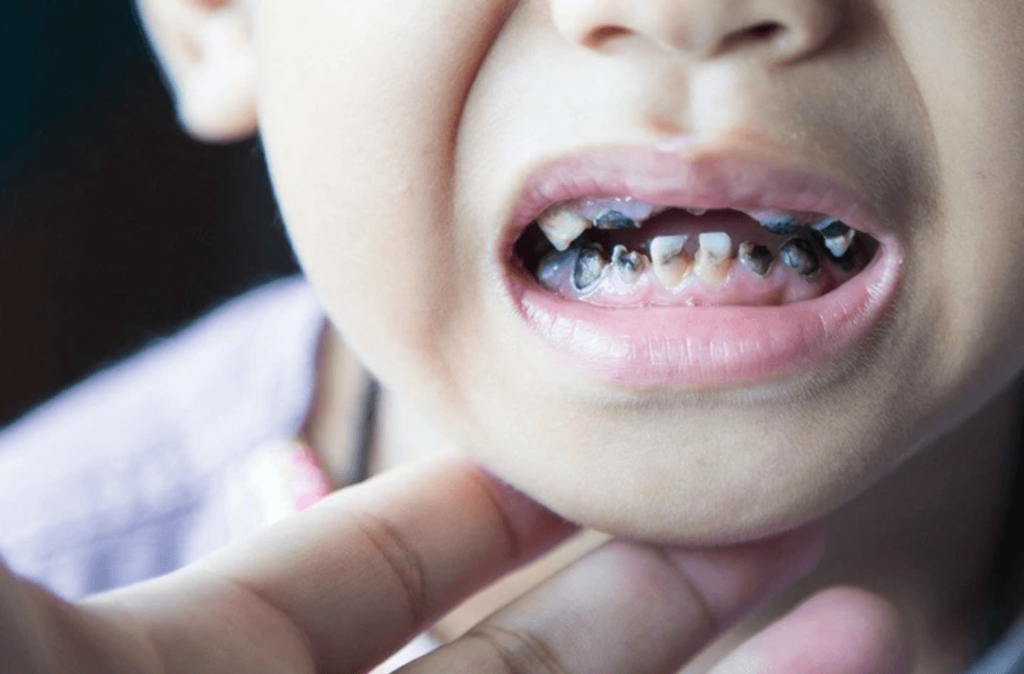Tooth decay is a common and concerning issue among children worldwide. Known scientifically as dental caries or cavities, tooth decay can cause significant pain and discomfort if not addressed promptly. Parents and caregivers can ensure their children’s teeth remain healthy by understanding the causes, recognising the signs, exploring treatment options, and implementing preventive measures. This comprehensive guide provides everything you need to know about tooth decay in kids.
What Causes Tooth Decay in Kids?
Understanding the root causes of tooth decay is the first step in prevention. Some primary factors include:
Poor Oral Hygiene
One of the leading causes of tooth decay in children is poor oral hygiene. Inadequate brushing and flossing allow plaque—a sticky film of bacteria—to build up on teeth. Over time, this plaque can erode tooth enamel, leading to cavities.
Diet High in Sugars and Carbohydrates
Frequent consumption of sugary snacks and drinks is another significant contributor to tooth decay. Sugars and carbohydrates feed the harmful bacteria in the mouth, producing acids that attack the enamel.
Lack of Fluoride
Fluoride is essential for strengthening tooth enamel and preventing decay. Children who do not get sufficient fluoride through drinking water or toothpaste are more susceptible to cavities.
Bottle Feeding at Night
Prolonged bottle feeding, especially with sugary liquids, during bedtime can lead to tooth decay. The sugars from milk, formula or juice can remain on a child’s teeth for hours, providing a perfect breeding ground for bacteria.
Bacteria Transmission
Parents or caregivers can inadvertently transmit harmful bacteria to their children through saliva. This can happen by sharing utensils or cleaning a dummy with their mouth, introducing decay-causing bacteria into the child’s mouth.
Signs and Symptoms of Tooth Decay in Kids
Recognising the early signs of tooth decay can help in seeking timely treatment. Here are some common indicators:
White Spots
One of the earliest signs of tooth decay is the appearance of white spots on the teeth. These spots indicate mineral loss and can be an early warning sign of cavities.
Toothache
Children experiencing persistent tooth pain may be suffering from tooth decay. This pain, often exacerbated by eating or drinking, signals that a cavity may be present.
Visible Holes or Pits
As decay progresses, it can cause visible holes or pits in the teeth. These cavities can trap food particles, further exacerbating the problem.
Sensitivity
Increased sensitivity to hot, cold or sweet foods can be a symptom of tooth decay. This sensitivity occurs when the protective enamel has been worn away, exposing the underlying dentin.
Swelling or Abscess
In advanced stages of decay, children may develop swelling or an abscess—a pocket of pus—around the affected tooth. This condition requires immediate medical attention.
Treatment Options for Tooth Decay in Kids
If tooth decay is detected, various treatment options are available, depending on the severity:
Fluoride Treatments
Professional fluoride treatments can help remineralize enamel and halt the progression of early decay. Fluoride varnish applications are quick and painless procedures typically performed during dental check-ups.
Dental Fillings
For more advanced decay, dental fillings may be necessary. The dentist will remove the decayed part of the tooth and fill it with a restorative material, such as composite resin or amalgam.
Crowns
In cases of extensive decay, a crown may be required to cover the damaged tooth. A crown restores the tooth’s shape, size, and function, protecting it from further damage.
Tooth Extractions
Severe decay that cannot be repaired with fillings or crowns might necessitate tooth extraction. While it is often a last resort, removing a severely decayed tooth can prevent infection from spreading.
Root Canals
When decay reaches the tooth’s nerve, a root canal may be necessary. This procedure involves removing the infected pulp, cleaning the inside of the tooth, and sealing it to prevent further infection.
Tips to Prevent Tooth Decay in Kids
Prevention is always better than cure. Implementing the following tips can help keep your child’s teeth healthy and decay-free:
Regular Brushing and Flossing
Ensure children brush their teeth twice daily with fluoride toothpaste and floss regularly. Teaching proper brushing techniques and supervising young children can help inculcate good oral hygiene habits early on.
Healthy Diet
A balanced diet plays a crucial role in oral health. Limiting sugary snacks and drinks and encouraging a diet rich in fruits, vegetables, and whole grains can reduce the risk of tooth decay.
Routine Dental Check-Ups
Regular dental visits are essential for maintaining oral health. Schedule check-ups every six months for professional cleanings and examinations to detect any early signs of decay.
Use of Fluoride
Fluoride helps strengthen tooth enamel and prevent decay. Ensure children use fluoride toothpaste and, if necessary, consult the dentist about fluoride supplements or treatments.
Dental Sealants
Dental sealants are thin protective coatings applied to the chewing surfaces of back teeth. They help prevent decay by sealing out plaque and food particles from grooves and pits.
Avoid Bottles at Bedtime
Avoid putting your child to bed with a bottle or sippy cup filled with sugary liquids. If your child needs a bottle for comfort, fill it with water instead.
Conclusion
Tooth decay in kids is a serious issue that requires prompt attention and preventive measures. By understanding the causes and recognising the signs of decay, parents and caregivers can take proactive steps to protect their children’s oral health. Implementing good oral hygiene practices, maintaining a healthy diet, and scheduling regular dental check-ups are crucial in preventing cavities and ensuring a lifetime of healthy smiles.
Taking these steps not only helps in preventing tooth decay but also instils good oral hygiene practices that children can carry into adulthood. After all, a healthy smile begins with strong, well-cared-for teeth.
Disclaimer: The information provided in this article is for informational purposes only and should not be considered as medical advice from Mamahood. For any health-related concerns, it is advisable to consult with a qualified healthcare professional or medical practitioner.
For more insightful stories and parenting advice, stay tuned to Mamahood Singapore!
